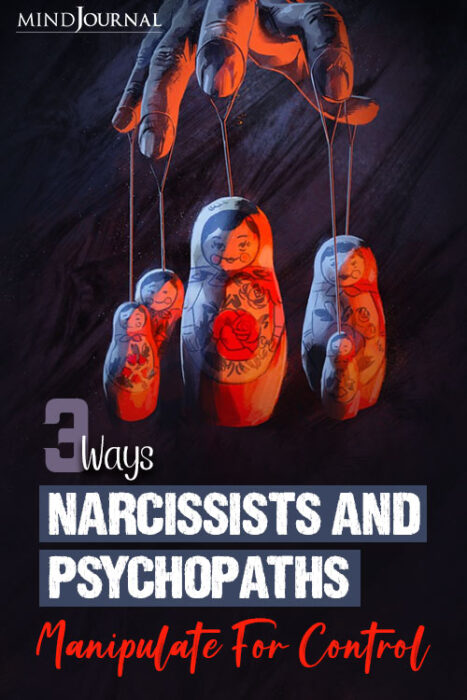This post explains three mental states and the different ways narcissists and psychopaths manipulate the people they are trying to control.
While it is true that those who have psychopathic and narcissistic tendencies do not feel the whole range of emotions a normal human being would, they have an acute understanding of that range.
While their experience with emotions is limited to superficial feelings, they are skilled at analyzing what others are going through and using that knowledge to manipulate them till they can bring them completely under their control.
Due to their inability to feel like others, they are often bored and irritable. This causes them to constantly crave turmoil around them.
Given that they are also extremely egoistic and are driven by their need to have complete control over every person and situation they come across, they try to use the feelings of other people to satiate their hunger for drama.
How narcissists manipulate their victims? Or how do psychopaths play with their prey?
Psychopaths and narcissists start preparing their victims as soon as they meet them. We all know about that initial ‘honeymoon’ phase that exists in every relationship wherein each party is trying to be as perfect as possible to please the others.
Psychopaths and narcissists take this a step further, acting like they are the personification of charm.
Related: Why Do Narcissists Abuse Those They Love?
They will pamper and flatter their victims so that they start thinking that they will never find anyone who will love them more or treat them better. The victims begin to feel safe and secure in the relationship and they gradually drop their guard.
This is the point when everything will change. As soon as the psychopath or narcissist sees that an intense connection has come into play, they will start treating the victims in the opposite way to what they were doing before.
They will use the feelings of comfort, love, and security they have instilled in their victims to manipulate them into doing their bidding.
Let’s find out how narcissists and psychopaths manipulate their victims and the different ways narcissists and psychopaths manipulate their prey.

3 Ways Narcissists and Psychopaths Manipulate To Gain Control Over You
1) When their victims are very happy with them.
This is one of the worst ways narcissists and psychopaths manipulate their victims.
After the initial ‘honeymoon’ phase wherein the victim is treated like they mean the world to the psychopath or narcissist, they begin to feel contented and happy.
They think that they have found someone who is giving them all their love and affection. However, the truth is that the psychopath or narcissist doesn’t understand or care to understand either of those emotions.
They bear no meaning in their minds. From the start, the narcissist or psychopath knew that they would not reciprocate those emotions.
They also know that if the victim remains happy, they won’t get the drama they started this relationship for in the first place.
As the relationship progresses, if the victim continues to be satisfied, the narcissist or psychopath will start getting bored and frustrated.
To relieve themselves, they’ll begin to exert their control over the victim in subtle ways. They’ll use the influence they have gained to silently bring down the happiness of their victim so that they will get the drama they’ve been looking for all this time.
Related: How To Spot A Psychopath? 7 Non-Verbal Signs Of Psychopathy And Their Meanings
2) When they make their victims feel jealous.
A method they favor to get to their goals is to make their victim feel jealous.
They’ll begin by making the victim believe that they have rivals for the affection of the narcissist or the psychopath. They will bring in their old partners, colleagues, acquaintances, and just about anyone who is remotely connected to them, usually without the knowledge of that third party.
They will use these relationships to further their narcissistic or psychopathic ambitions. Their first aim is to satisfy their own pride. This is a major driving factor behind many of their actions because their ego is so huge that it controls most of what they do.
Their second goal is to ensure that the victim has been prepped to fulfill their desires while simultaneously they work to retain the victim’s love.
Their third goal is to keep the victim desperate so that it will be easy to make them believe that something is wrong with them so that they will believe that they are to blame for whatever the narcissist or psychopath accuses them of doing.
A good way to ensure that the victim is not stable is by keeping them jealous because of some artificial threat to their relationship with the narcissist or psychopath.
By making the victim look crazy, they make themselves look like they are being oppressed even though it is the other way around. They’ll provoke the victim in front of others so that they look like they are overreacting.
3) When their manipulation makes their victims angry and they finally show their rage.
How psychopaths manipulate their victims, you ask? Just like this!
Jealousy is not an emotion that rises by itself.
It is usually complemented by emotions like rage and irritation. This only works to the advantage of the narcissist or psychopath because it becomes easier for them to prove that the victim is mentally unstable.
They will react to the emotions of the victim in a number of ways. They might respond by not responding at all. There will be complete silence when you try to talk to them about what you are going through.
Or they’ll keep beating around the bush. In the end, the victim’s rage will serve as an excuse to leave them for some time.
The narcissist will defend this by saying that they had to leave because the victim was treating them badly. They might try to make the victim feel guilty and remorseful so that they take the blame even though it was the narcissist or the psychopath who created this situation.
The victim will start bottling up their emotions so that they don’t seem unreasonable and the narcissist or psychopath will not leave them. They’ll treat the narcissist or psychopath as a fragile thing and this will only contribute to their mental instability.
By doing this, the psychopath or narcissist has established their control over the victim. The latter will wish for the bliss they found in their honeymoon stage and will do whatever it takes to keep the narcissist or psychopath happy so that they can be happy.
Related: 30+ Telltale Signs Of A Narcissistic Wife And How To Protect Your Mental Health
They won’t be able to go back to the early days but they will be happy with whatever scraps of affection they get. Through it all, the narcissist or psychopath will continue to manipulate them till they break or they run away.
So, this is how psychopaths and narcissists control victims. Have you ever had to deal with a narcissist’s or psychopath’s manipulation? Let us know your thoughts in the comments down below!
The Minds Journal Articles Volume -1 is Copyright Protected vide Regd.# L-103222/2021











Response
So true!